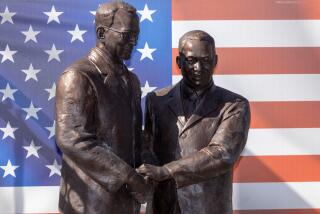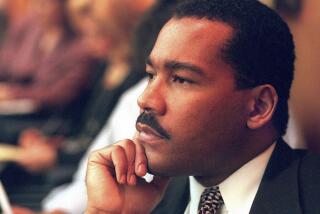The true King
You’d better not kill anybody after 6:01 p.m. today, or you’ll really rile the Los Angeles County Board of Supervisors. It has passed a resolution declaring a 40-hour moratorium on violence, starting at a time that marks to the minute the 40th anniversary of the assassination of the Rev. Martin Luther King Jr.
That the anniversary of King’s shocking murder attracts this kind of silliness is no great surprise. In the two-score years since his death, he has become, in the mold of other great Americans like George Washington or Mark Twain, a figure more legend than human, his story so simplified and sugarcoated for easy digestion by schoolchildren that even adults who lived through the troubled 1960s have a tough time separating their memories of the man from the myth.
We don’t need to canonize King to appreciate his many accomplishments, nor declare time-wasting moratoriums to mourn his passing. He was a complex man with messy personal affairs who unified people of all races on the issue of civil rights, while dividing many with his controversial stance on the Vietnam War -- he claimed in one major speech that the U.S. government was “the greatest purveyor of violence in the world today,” a comment as controversial then as the “God damn America” sermon from presidential candidate Barack Obama’s pastor, now making the rounds on YouTube, is today.
In the final years of his short life, King became nearly as concerned about the war and the plight of the poor as he was about racial discrimination. His murder silenced one of the most powerful voices on these topics that this country has ever known, and we’re still paying the price; if King were alive today (he would have turned 79 on Jan. 15), the fight against poverty would probably be higher on the national political agenda and the opposition to the Iraq war more focused. It is poignant to imagine how King, who squarely understood Vietnam as a failure of American conscience, would regard the current conflict -- a moral, military and diplomatic misadventure now in its sixth year, with more than 4,000 American dead and untold damage to this nation’s place in the world.
Congress in 1983 made the anniversary of King’s birth, not his death, a national holiday. Its celebration remained controversial until 2000, when South Carolina, the last state to officially recognize it as a paid holiday for government employees, finally gave in. There will be no holidays today, but it’s still worthwhile to pause for a moment to remember that terrible day in 1968 when King was gunned down on a hotel balcony in Memphis. We didn’t lose a superhero who single-handedly ended discrimination in America, as legend would have it; we did lose a man who, warts and all, pricked the conscience of the nation and made it a better one.
More to Read
Sign up for Essential California
The most important California stories and recommendations in your inbox every morning.
You may occasionally receive promotional content from the Los Angeles Times.










